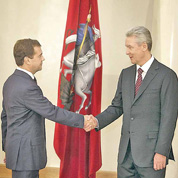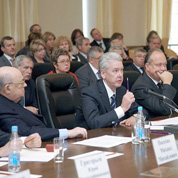Economic and political consequences of regime change in Moscow

Just as with a sudden death, the former city administration, forced to resign without prior notice against his wish, has left a rich legacy in the form of a multibillion-billion city economy but without a ‘concrete will’ on how its successor should use it. The current situation is further complicated by the fact that this multibillion-billion economy had been built around and personified by the now-disgraced mayor. Therefore, his sudden dismissal without taking some prophylactic measures to keep things in order poses a tangible threat to the smooth running of the city management mechanism, a situation capable of breeding complete chaos in the social, political, economic and business life in the capital.
Seeking balance between social stability and the need to overhaul the City Hall
The attempts to avoid such ugly scenarios, according to experts, probably explains some of the prudent and cautious measures taken by the new Moscow administration to preserve the current social and economic stability in the city as well as its attractiveness to investors. For instance, according to the Institute for Global Research and Social Movements (IGSO), the retention of some Luzhkov team’s members in the new City Hall government is aimed at calming investors and preserving social stability in the capital. But it is the newly appointed officials that are being placed at the most politically significant sectors as the central authorities are bent on creating new political leverage mechanisms in Moscow. However, massive sacking of all the key officials from the previous administration in one stroke is neither envisaged nor desirable, as a total replacement of all Luzhkov’s proteges in the new City Hall administration could lead to unwanted nervousness among the city’s strategic investors.
“Preservation of seats for several of Luzhkov’s officials is an effort to reassure the city’s investors, who are loyal to and needed by the federal authorities. However, after a while the new Moscow administration will start to drastically change the existing business model in the city,” IGSO Director Boris Kagarlitsky said. “It may increase the probability of a controlled or spontaneous fall of prices in some segments of the city’s economy, say, for instance, on the real estate market, in 2011. On the other hand, cautiousness is needed as volatility in the country’s capital is highly undesirable for the federal authorities at this point in time.” According to IGSO, the ongoing changes in the Moscow ruling system will enable the federal government to exert more control over city’s economy, generating over 20% of the country’s GDP, estimated at over $1.23trln in 2009, and also influence the policies in other Russian regions and CIS countries.
“The desire to avoid ugly scenarios in post-Luzhkova era explains some of the cautious measures being taken by the new mayor, who wants to preserve the existing social and economic stability in the city.”
Currently, a process is now in progress in the City Hall of shifting the responsibility for the existing economic and administrative difficulties to the former city administration. However, it is obvious that the process of changing all Luzhkov’s appointees in the city administration has already started and will only gain more speed with time until all the traces of influence of the former administration in Moscow’s social, political, economic and business life are eradicated. For instance, on Oct. 26, 2010, Sobyanin announced the composition of his new cabinet, where the representatives of the federal authorities were given major roles and portfolios. Specifically, such newly appointed officials as Natalia Sergunina, Alexander Gorbenko and Nikolay Lyamov were named deputy mayors for land and property relations, mass media relations and transport, respectively, while the post of the Chairman of Committee for Moscow Cultural Heritage was given to Alexander Kibovsky, the former head of Federal Agency for Law Compliance in the Field of Cultural Heritage Protection.
The new appointees are being placed in key sectors of the city’s economy that have the highest political and economic value both for capital and the country as a whole. According to expert opinions, such a tendency can be demonstrated by the example of the currently evolving situation in the city’s Land Utilization Committee, one of the key areas in the Moscow government. “Control over land utilization in Moscow is an important political instrument at both the federal and international level,” Mikhail Neyzhmakov, the director of the IGSO’s International Policy Analysis Center, said. “This is why all the federal special interests lobbyist groups, the biggest regional business players and ethnic business diasporas want their shares of the Moscow real estate and property development market,” he added. “This is one of the major reasons why officials from the previous administration connected with land and property issues were among the first to be fired by the new mayor.
A declaration by the new mayor on the necessity to preserve the city historical look was motivated not only by aesthetic reasons. In practice, this policy envisages the  replacement of the existing construction companies on the Moscow construction market that have close ties with the Luzhkov administration. The first to go will be those construction companies that are most commonly blamed by the media and the general public for the destruction of the city’s historical facade. Besides, the Moscow government’s interests in this sector under the new mayor will be focused on major infrastructure project developments, and not office space constructions. The new priorities are going to be less focused on city’s historical sites.
replacement of the existing construction companies on the Moscow construction market that have close ties with the Luzhkov administration. The first to go will be those construction companies that are most commonly blamed by the media and the general public for the destruction of the city’s historical facade. Besides, the Moscow government’s interests in this sector under the new mayor will be focused on major infrastructure project developments, and not office space constructions. The new priorities are going to be less focused on city’s historical sites.
A similar scheme is going to be used to cleanse other sectors of the Moscow economy and solve other challenges facing the new mayor. For example, under the pretext of fighting traffic jams, the new government is dismantling all street retail business infrastructures in the city. Specifically, the city’s major streets were cleared of kiosks and other small-scaled retail business facilities within a couple of days. Obviously, redistribution of business interests has started in this sector. It is a well-known axiom that nature abhors vacuum, and consequently, the street kiosks being dismantled today will eventually be replaced by new ones, belonging to other business interest groups.
Sobyanin needs to prepare Muscovites in advance for major policy changes in the city
The new mayor has ambitious plans to improve the life of Moscow citizens and transform the city itself into a one of the best capitals in the world in terms of investment attractiveness, protection of capital invested in the economy and the level of comfort for living and working. Only time will tell how many of these good intentions will eventually and successfully see the light of the day. But the fact that the new mayor, unlike his predecessor, has the full trust and confidence of the country’s ‘ruling tandem,’ and also the fact he is a core member of the famous Kremlin’s ‘power vertical’ with good experience and successful work at both the regional and federal levels, will help create a new, and most importantly, more constructive atmosphere between the Kremlin, the White House and the new Moscow government. It was this type of productive mutual understanding with the federal government that Luzhkov lacked in the last days of his administration.
The presence of such an idyll in the city will create favorable conditions for performing any feat, including positively solving all the tasks facing the new mayor. All Muscovites want is that these tasks will be solved not at their expense or to please the authorities, but to fully satisfy their yearning and vital needs. However, judging by the dismantling of small retail business facilities in crisis times, which are sources of employment and, consequently, means of sustenance for a significant number of Muscovites, one can see the beginning of a bad trend, where the publicly declared policy of protecting common citizens’ interests will not have precedence over the realization of tasks that are considered more relevant by the state. And this is bad as it means the preservation of the Luzhkov era’s status quo, characterized by a complete disregard for Muscovites’ legal and interests. This was the case with the illegal evictions of Muscovites from their residences in the Yuzhnoye Butovo district, a similar practice that repeated later in the Rechnik residential area in the Moscow suburb.
“The ongoing changes in the Moscow ruling system are to enable the Kremlin exert more control over the city’s robust economy, generating over 20% of the country’s annual GDP.”
The onus is on the new mayor to prove the contrary; namely that all his moves and efforts in his capacity as Moscow mayor, both tactical and strategic, will always be aimed at boosting the prosperity and welfare of the city’s residents. As there are lots for him to do, and parts of the planned changes will certainly lead to unanoivadle difficulties in the city, the new mayor needs to prepare the citizens well in advance to make them understand and have no doubts that both the city and the country as a whole stand to gain generously from the overall benefit from his planned policy changes in the long term, even if such benefit will be not be clearly obvious in the short term.












 Web design,
Web design,